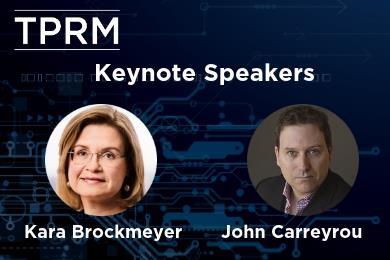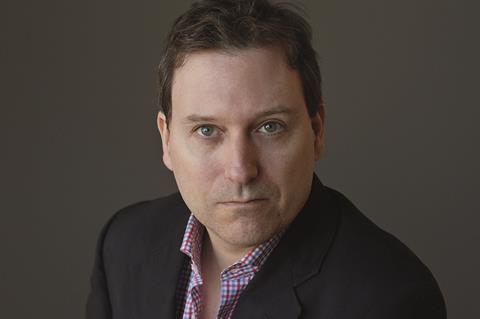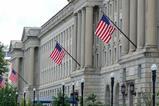John Carreyrou, the Wall Street Journal investigative reporter who exposed now-defunct blood testing company Theranos and its founder Elizabeth Holmes as frauds, will be the keynote speaker on Day 2 of Compliance Week’s Third-Party Risk Management Virtual Conference on Sept. 18.
TPRM Virtual Conference

Join Compliance Week on Sept. 17-18 for a two-day virtual event covering vendor due diligence and onboarding challenges; the impact of COVID-19 on fraud and anti-corruption in the supply chain; the regulatory response to change; automation in the new normal; and more.
Enter code carreyrou15 at checkout for $15 off. (Code is valid for new registrants only and may not be retroactively applied.)
Carreyrou is also the author of the best-selling book “Bad Blood: Secrets and Lies in a Silicon Valley Startup,” which chronicles Holmes’ deception and her company’s dramatic rise and fall. Bolstered by the testimonies of more than 60 former Theranos employees—including whistleblower Tyler Shultz—Carreyrou revealed the company had lied to employees, shareholders, board members, and the public about the capabilities of its blood-testing devices, which could not do what the company claimed they could do.
Theranos engendered a culture of fear through siloing, deceit, verbal and legal intimidation, and tyrannical leadership—namely from Holmes and her right-hand man, Ramesh “Sunny” Balwani.
Carreyrou’s book tells the story of how Theranos’s leadership hoodwinked not just its investors and board members, but also its third parties—for years—and lays bare the shades of duplicity carried out to secure those partnerships. Carreyrou offers lessons to other companies in how to become better sleuths where their own third-party relationships are concerned: by asking the right questions of prospective partners, maintaining a healthy skepticism, and remaining alert to red flags.
Carreyrou’s work shows how to see through the allure of a smoke-and-mirrors operation.
Theranos-inspired tips for third-party risk management
Carreyrou worked closely with Shultz over the course of his investigation. Shultz recently came out with a podcast, Thicker than Water, detailing his own perspective on the duplicity perpetrated by Holmes and Balwani during Theranos’s rise to Silicon Valley darling. Together, Carreyrou and Shultz showcase the tell-tale signs of fraudulence—things to be mindful of when vetting a vendor:

Be on the lookout for excessive secrecy. “The only thing Elizabeth was not secretive about was being secretive,” Shultz stated on his podcast. Carreyrou’s work details how third-party partners, in addition to Theranos employees like Shultz, had to sign ironclad non-disclosure agreements, adding to the illusion Theranos was acting hush-hush because of its “revolutionary” technology. Although NDAs are typical, particularly in the competitive culture of Silicon Valley, you should not equate extreme stealth with hidden gems.
Do not get entranced by an aura. Carreyrou points out that many high-level executives fell for Holmes’s “aura,” as he put it, at the expense of sound reasoning. For instance, Safeway CEO Steve Burd’s enchantment with and blind faith in Holmes led to high-risk business moves that ultimately cost him his job.
“When she’s talking to you, she makes you feel like you are the most important person in her world in that moment, and that you can essentially join her in changing the world, and that you are so important to achieving this vision,” Shultz said on his podcast.
Carreyrou will discuss these warning signs and more at Compliance Week’s TPRM virtual event on Sept. 18.
Theranos and its legal challenges
Holmes, 36, founded Theranos in 2003. Prior to Carreyrou’s exposé, Theranos garnered media attention for being spearheaded by a 19-year-old Stanford University dropout touted as “the next Steve Jobs.” The company purported to be revolutionizing medical laboratory testing through allegedly innovative methods for drawing and testing blood and interpreting test results.
After Carreyrou’s investigative reporting was published, the Securities and Exchange Commission (SEC) charged Theranos, Holmes, and Balwani in March 2018 with “an elaborate years-long fraud,” wherein they exaggerated or made false statements about the company’s technology, business, and financial performance. Theranos and Holmes settled the fraud charges; Holmes agreed to pay a $500,000 penalty, relinquish voting control of Theranos, return the remaining 18.9 million shares she obtained during the fraud, and be barred from service as an officer or director of a public company for 10 years. In addition, once the company was liquidated, Holmes would not profit from her ownership until $750 million was returned to defrauded investors and shareholders. Balwani did not settle.
In June 2018, the U.S. Attorney’s Office for the Northern District of California indicted Holmes and Balwani on two counts of conspiracy and nine counts of wire fraud. Witnesses called to testify in the upcoming criminal fraud trial may include several high-profile former Theranos board members and investors: former U.S. Secretary of State Henry Kissinger, media magnate Rupert Murdoch (owner of the Wall Street Journal), and former U.S. Secretary of Defense James Mattis.
Previously, Holmes was named the world’s youngest female self-made billionaire, and Theranos was privately valued at close to $10 billion. Holmes and Balwani each face up to 20 years in prison if convicted.
The trial for Holmes, which has been delayed due to the coronavirus pandemic, is scheduled to begin late next March.
Walgreens, Safeway offer cautionary tale
While in operation, Theranos partnered with two major retail giants: drugstore chain Walgreens and supermarket chain Safeway.
Safeway struck a deal with Theranos at an undisclosed time (initial talks reach as far back as 2011), loaning the company $30 million and pledging to renovate its stores to make room for Theranos blood clinics. In the end, Safeway spent $350 million retrofitting more than 800 locations (about half of its stores at the time) with clinics. Theranos never delivered. The startup continually delayed rollout of its blood-testing services and, in the end, the tests never even began. In 2015, the deal was called off, Carreyrou reported at the time.
Theranos began courting Walgreens as early as 2010. The drugstore giant and biotech startup announced a formal deal in 2013, when Walgreens would offer in-store, Theranos-run blood drawing sites at 40 locations in Arizona and one in California. In 2016, Walgreens terminated the partnership and filed suit against Theranos for breach of contract. The drugstore chain alleged Theranos had continually misled Walgreens, dodged questions about the technology’s validity and put Walgreens customers at risk, Carreyrou and his colleagues reported. Walgreens sought $140 million in damages—the same amount it had invested—but settled for less than $30 million in 2017.


















No comments yet